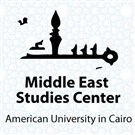On 19 February 2014, the Middle East Studies Center at the American University in Cairo hosted Sherief Gaber, a member of the Mosireen film collective and researcher in housing rights and community development, for a lecture titled “Mosireen and the Battle for Political Memory.’’
Gaber discussed the mission and activities of the Mosireen film collective. Mosireen, or ”We are determined,” is a non-profit media collective dedicated to preserving and sharing images and video documenting the extraordinary events during and since the January 2011 Egyptian uprising. In the last three years, the group has established a popular YouTube channel, produced hundreds of short documentaries, amassed an enormous archive of recordings of the events of the uprising, and hosted a number of public events to screen and discuss their films.
For Gaber, the group’s purpose goes beyond simply capturing and sharing the images of the revolution. Gaber noted the influence of the philosopher Walter Benjamin on his work. Gaber recalled a poignant quote from Benjamin’s “Thesis on the Philosophy of History”: “To articulate what is past does not mean to recognize ‘how it really was.’ It means to take control of a memory, as it flashes in a moment of danger.” In line with this critical understanding of memory, Gaber’s and Mosireen’s work disavows establishing a single historical narrative. It focuses instead on fracturing the currently-rigid binary perspectives by showcasing the diversity of experiences arising from a single event.
This diversity, Gaber argued, is key in combating the influence of powerful state and media voices engaged in what Gaber termed “pernicious revisionism.” According to Gaber, these voices have consistently forced broad public adoption of oversimplified, sanitized narratives that attempt to erase not only the crimes and violence committed by the state during the events of the last three years, but also the individual experiences themselves. According to Gaber, one can only view the past through the prism of the present.
Gaber pointed to several trends in public thought that are important for making sense of the last three years. Due to the current political situation we arrive at a moment of hopelessness and even doubt over the transformative nature of the post-Jan 2011 period. Simultaneously, we see nostalgia for the early days of the uprisings in comparison to the present. Gaber noted that the fetishization of “the glory days” extends back to Egypt under Mubarak, Sadat, Nasser, and even King Farouk. This longing for the past, Gaber indicated, also shows a generational friction over meaning and memory. An attempt to control the significance of certain events is hopefully the ‘’last gasp’’ of the previous establishment.
With the increasing level of danger for journalists reporting on protest activity in Egypt and unprecedented degrees of narrative collusion between Egyptian media organizations and the state, Mosireen’s work is more important than ever, Gaber said. The function of Mosireen’s work is not intended simply as evidence of “we were there” but to try and makes sense of what is happening now. The end-goal of preserving political memory, he noted, is to preserve political spaces and cultivate a continuous, productive dialogue over meaning. “History,” he concluded, “is dangerous when it becomes a monolith.”
Throughout this discussion, the journey of Mosireen and the contest over meaning highlighted the struggles of Egypt’s protest movements. Sabrina, an MA student at the Middle East Studies Center, drew parallels between the lack of hierarchy within Mosireen and the Egyptian resistance movements more broadly. Gaber pointed out Egypt’s long history of surveillance over any attempts of seemingly-subversive organization. Moving away from traditional models of social change, Gaber acknowledged the place and importance of topic-based movements such as “No to Military Trials for Civilians” campaign. Gaber described the archive of Mosireen as a “subjective document” and as such Egypt’s recent history appears to be open for only one subjective narration. Yet Gaber also acknowledges hope, and a popular energy that will continue to render Egypt “ungovernable.”
For more information on the Middle East Studies Center at the American University of Cairo and our future events please follow us on facebook here and twitter here.
![[Image of speaker Sherief Gaber. Source: YouTube.com]](https://kms.jadaliyya.com/Images/357x383xo/mosireenauc.jpg)






![Teaching Palestine Today: On the [F]Utility of International Law](https://kms.jadaliyya.com/Images/63x63xo/bruh250421081905840~.png)








